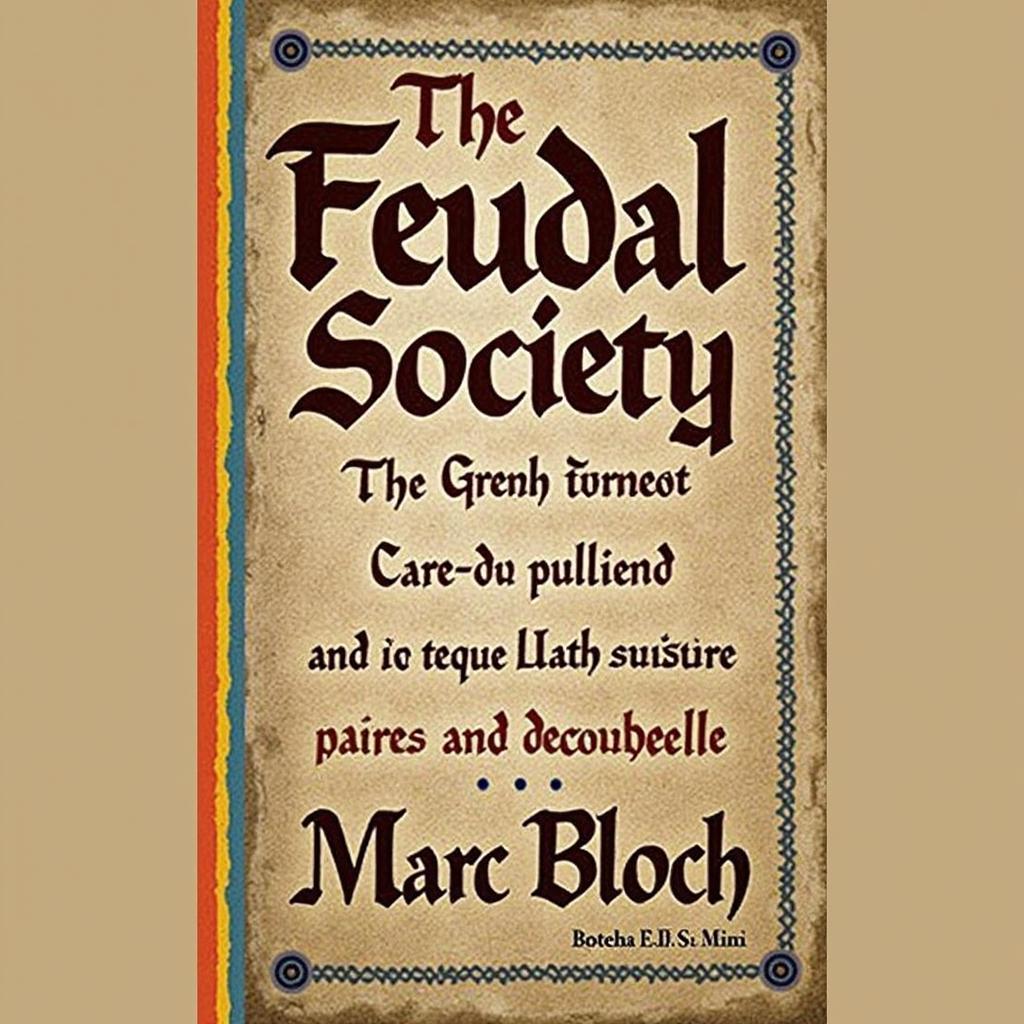Marc Bloch’s Feudal Society is a seminal work in medieval history, offering a comprehensive and nuanced understanding of feudalism in medieval Europe. Bloch moved beyond traditional legal and institutional approaches to examine feudalism as a complex social system, encompassing economic, political, religious, and cultural aspects. His innovative comparative method and focus on mentalities revolutionized the study of the Middle Ages.
Understanding the Core Concepts of Marc Bloch’s Feudal Society
Bloch’s Feudal Society challenged the then-prevailing narrow definitions of feudalism, which focused primarily on legal and military aspects. He argued that feudalism was far more than just a system of land tenure and vassalage. Instead, he presented a multifaceted view, emphasizing the interplay of various factors that shaped medieval society. This included the role of the Church, the dynamics of rural life, the emergence of towns, and the evolving nature of power and authority. Bloch explored the bonds of personal dependence, the fragmented political landscape, and the pervasive influence of religious beliefs, painting a vivid picture of a society grappling with change and continuity. His analysis delves into the psychological and emotional dimensions of feudal relationships, demonstrating how these bonds shaped social interactions and political structures.
 Marc Bloch's Feudal Society Book Cover
Marc Bloch's Feudal Society Book Cover
The Comparative Method and the Annales School in Marc Bloch’s Work
A key innovation of Bloch’s approach was his comparative method. He drew parallels and contrasts between different regions of Europe, highlighting regional variations within the broader framework of feudalism. This approach, deeply rooted in the principles of the Annales School, allowed him to identify commonalities and divergences in the development of feudal institutions and social structures across Europe. By comparing and contrasting various regions, he was able to discern patterns and understand the complex interplay of local and broader forces. Bloch’s association with the Annales School, a groundbreaking movement in historiography, is crucial to understanding his approach. The Annales School emphasized long-term historical processes, social and economic structures, and the importance of mentalities – the collective attitudes and beliefs of a particular period.
 Marc Bloch and the Annales School Historians
Marc Bloch and the Annales School Historians
The Significance of Mentalities in Feudal Society
Bloch delved into the “mentalities” of medieval people, exploring their beliefs, values, and worldview. He examined how these mental frameworks influenced their social practices, political decisions, and economic activities. By understanding the collective mindset of the era, he could better explain the seemingly irrational or illogical aspects of feudal society. This focus on mentalities offered a deeper insight into the motivations and actions of individuals and groups within the feudal system. Bloch’s analysis of religious beliefs, superstitions, and social customs reveals the profound impact of these intangible forces on the shaping of medieval society.
What were the key features of feudal society according to Marc Bloch? Bloch highlighted the personal bonds of dependence, fragmented political authority, and the pervasive influence of the Church as key features.
The Legacy of Marc Bloch’s Feudal Society
Feudal Society remains a foundational text for understanding the Middle Ages. Bloch’s innovative methodology, his focus on social and economic structures, and his exploration of mentalities continue to inspire historians. His work has shaped generations of scholarship and remains a testament to the power of historical inquiry to illuminate the human past. Bloch’s profound impact on medieval studies is undeniable, shaping our understanding of feudalism and its complexities. His work encourages us to move beyond simplistic narratives and embrace the nuances of historical change.
Conclusion: A Lasting Contribution to Historical Understanding
Marc Bloch’s Feudal Society offers a profound and enduring analysis of medieval Europe. His insightful examination of feudal society continues to resonate with scholars and readers alike, providing a valuable framework for understanding this complex period. Bloch’s work invites us to explore the intricate web of social, economic, political, and religious factors that shaped the medieval world.
FAQ
-
What is the central argument of Feudal Society? Bloch argues that feudalism was a complex social system, not just a system of landholding.
-
How did Bloch’s approach differ from earlier historians? He emphasized social, economic, and mental aspects, going beyond legal and institutional frameworks.
-
What is the significance of the Annales School in Bloch’s work? The Annales School’s emphasis on long-term structures and mentalities influenced Bloch’s approach.
-
Why is Feudal Society still relevant today? It provides a nuanced and insightful understanding of the Middle Ages, influencing historical scholarship even today.
-
What is meant by “mentalities” in Bloch’s work? Mentalities refer to the collective attitudes, beliefs, and worldview of a particular historical period.
-
How did Bloch use the comparative method? He compared different regions of Europe to understand variations and commonalities in feudal development.
-
What is the main legacy of Marc Bloch’s work? His innovative methodology and focus on social, economic, and mental factors transformed the study of the Middle Ages.
Need Help?
For further assistance, please contact us:
Phone Number: 02043854663
Email: [email protected]
Address: Khu 34, Bac Giang, 260000, Vietnam
We have a 24/7 customer support team available to assist you.